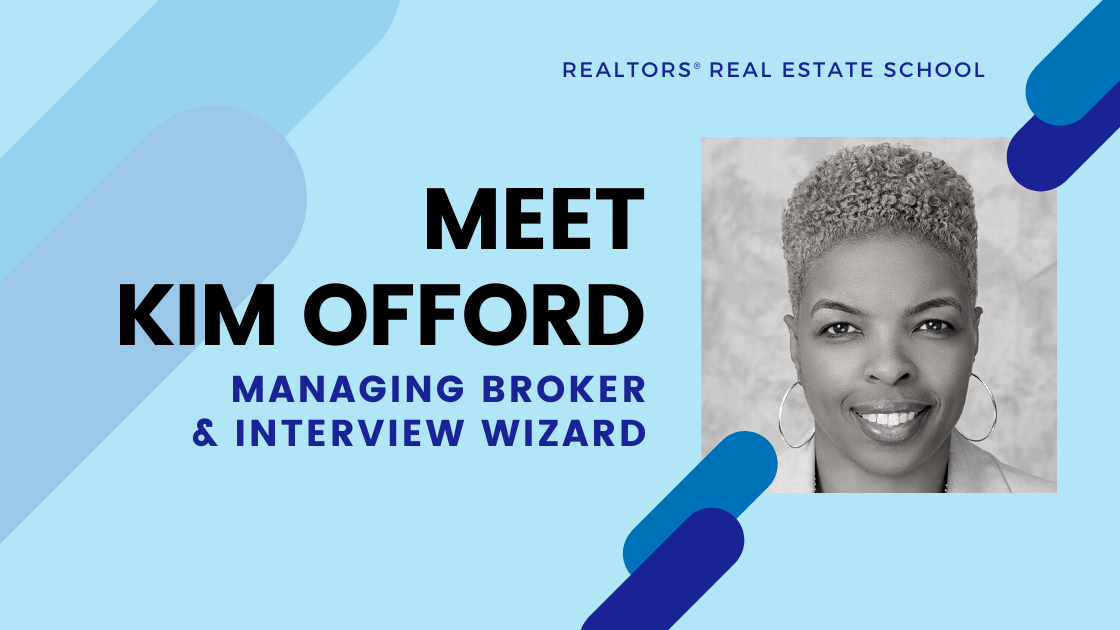Meet Kim Offord: Managing Broker & Interview Wizard
Kim Offord’s start in real estate wasn’t exactly typical. Referred to the business by her financial mentor, she joined as a part-time broker in her mentor’s boutique brokerage. This was 2006.
“I started in a rollercoaster climate!” she said. “What really helped me get through was my marketing background.”
Must-Have Business Skills
“You have to learn to be a chameleon so to speak. Be able to adjust to the market and brand yourself,” Kim advised. “This isn’t knowledge you learn in class.” More than anything, she says the difference between new brokers who sink and those who float is the ability to communicate without face-to-face interactions.
Kim has a bachelor’s and a master’s degree in marketing, and her experience as a marketing consultant provided a crucial foundation of how to be an entrepreneur.
“When people call you, the real question is: are you going to be able to solve the problem they’re bringing to the table?” Kim said. “Your expertise is what you have. If you can’t have those conversations, paid ads mean nothing. If people don’t relate to you, your ability to lead generate is going to be a no-go.”
Advice for Building (And Joining) A Team
In 2015, Kim got her managing broker’s license in anticipation of building a team. Now, she runs a brokerage of eighteen brokers with an immediate team of four.
“Being managing broker of a team and an office is different,” Kim advised. At the office level, a day-to-day schedule will be composed mostly of training and administrative work. “Think lots of problem-solving and crisis management,” she added. As a team leader, Kim’s responsibilities are more around motivating and coaching and partnering with brokers.
If you plan on building your own team, Kim recommends making intentional structural decisions. While some teams are built on the leader receiving sole credit, she focuses on working together so that all team members benefit from the sales they close. Her goal is to build a good book of business and a strong referral network. However, each real estate team is different. Kim recommends that new brokers pay attention to these differences when they’re applying for their first teams.
Not sure how to stand out during an interview? Here are a few of Kim’s interview tips:
- Don’t ask “will you give me leads.” Instead, ask, “Will you help me learn how to acquire leads?” You’re asking if they’ll teach you a system of lead gen!
- Think of the long-game. You don’t want to get handouts, because that doesn’t build a strong career.
- When interviewing new licensees, she’s looking for people who have clearly thought the process through. Do your research.
- Here’s a great question: “What type of training does your brokerage offer?”
- Kim’s red flag: people who don’t want to invest time or lean into mentoring or support are more likely to behave haphazardly during the transaction. What are you willing to pour into your own training and into the team? How does this reflect your commitment and reliability as a real estate professional?
What’s Next?
Where does Kim see herself growing in the next few years? Managing and training brokers.
“If I had one regret it would be that I did not start my own real estate portfolio sooner in my career,” she said. She has learned what her tolerance level for work is, so now she looks towards investing for retirement.
Advice For New Brokers
“I see a lot of new brokers investing in the right things at the wrong time!” Kim said. “Such as, investing in paid ads too soon and too much. Stop, do some business planning and branding, then jump into paid advertisements.”
Kim also advises new brokers be intentional about which markets are a fit for them. From luxury residential real estate to retail, be flexible with what your leads and clients need.
“First-time homebuyers require a lot of handholding,” Kim advises. “If you don’t like the sound of that, then it isn’t your niche. Working with investors means lots of distressed properties and places that have been vacant a long time. Does that stress you out? Then, it isn’t your niche.”
Kim’s recipe for real estate success is simple. “Top producing real estate professionals do one thing well: they figure it out,” she said. “Figure out what you do well, then hammer that in.”
INTERESTED IN A CAREER IN REAL ESTATE?
We do encourage you to fill out the information request form below so we can reach out to you and make sure you have everything you need to start your new and exciting career.
